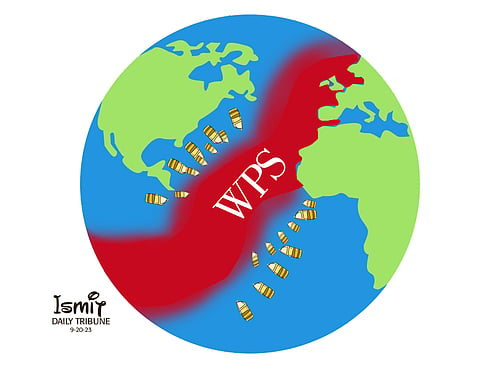
- NEWS
- the EDIT
- COMMENTARY
- BUSINESS
- LIFE
- SHOW
- ACTION
- GLOBAL GOALS
- SNAPS
- DYARYO TIRADA
- MORE

China's recent release of its rewritten claim in the 10-dash line map is a prelude to more aggressive actions in the West Philippine Sea or WPS, according to the assessment of Defense Secretary Gilbert Teodoro.
Through a media mouthpiece, Beijing described the revision of its boundaries as a "normal exercise of sovereignty by law." Security officials, however, view the new map as establishing China's intent to strengthen its "control and occupation of the West Philippine Sea."
Teodoro urged international support for the 2016 Permanent Court of Arbitration ruling invalidating China's historic claim, or "if that's not stopped, then the whole international rules-based order is in jeopardy."
China has consistently refused to arbitrate the overlapping claims in the WPS, insisting on bilateral dialogues or, at most, a settlement among claimants, which proved to go nowhere.
Negotiations for binding rules in a proposed Code of Conduct have failed to advance for over 20 years.
Ignoring China's increasing assertiveness jeopardizes global trade since nearly all of the region's goods shipments to the West and vice versa pass through the disputed waters.
"If China's claims are given credence, freedom of navigation and freedom of air traffic is jeopardized," Teodoro warned.
While China keeps blaming US intervention for creating instability in the region, the lack of concerted action among nations that Beijing encourages has led to its unbridled occupation of the sea features.
Teodoro stressed that China's "expansionist policy" heightens tensions.
"It is the expansionist policy of China that is escalating the tensions not only between us but with Vietnam and other actors, and their 10-dash line is the best proof that they want to escalate tensions within the area," he said.
Teodoro contrasted the actions of China and the Philippines, saying that while Beijing asserts an arbitrary historical claim, Manila insists on enforcing international law based on the arbitral ruling.
China's containment is also not the target of the expanded Enhanced Defense Cooperation Agreement between the Philippines and the United States.
"China keeps saying that we are containing them. If you use the word contain, that means to say you have an intention to expand, so for me, it's disingenuous for them to use that term," the defense chief explained.
Despite the assertion of China that the Philippines has given the United States a free hand to intervene in the conflict, Teodoro said the country's independent foreign policy of being a friend to all and an enemy to none is being maintained.
"The (recent) water cannon (incident) proves that we are not leaning too much on the US because if we lean too much on the US, we would have asked them to escort us there, which we don't want to do because we want to do things our way and we want a balanced foreign policy," he said.
President Ferdinand "Bongbong" Marcos Jr. said the country's independent foreign policy is being upheld. Still, we will adhere to enforcing international law, particularly the 2016 international tribunal ruling based on the provisions of the United Nations Convention on the Law of the Sea.
During the term of his predecessor, President Rodrigo Duterte, closer relations with China resulted in commitments of economic assistance and the fair resolution of the territorial rift through a CoC.
Only a few promises were realized, rewards for actions that showed hostility towards the Americans.
It didn't go far, however, as in the twilight of his term, Duterte had to raise the international tribunal's decision and the country's maritime rights.
Duterte said the ruling couldn't be erased, and China would have to follow it, resulting in acrimony that continues today.
